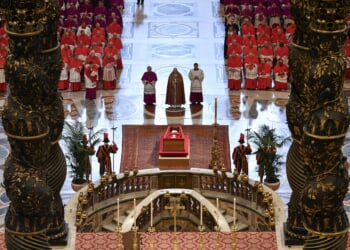Andrew RT Davies is Conservative MS for South Wales Central, and served as Leader of the Conservative Group in the Senedd from 2021 to 2024.
You won’t often hear this admitted by those in the Westminster or Cardiff Bay bubbles. But I’ll say it plainly: the old globalist consensus has failed. It’s failed working people. It’s failed communities across Wales. And it’s long past time we in the Conservative Party had the courage to say so – and to do something about it.
Now, let’s not kid ourselves. There have been winners from globalisation. Big winners. Major corporations that saw profits surge as they offshored production and cut costs. The very wealthy, able to move capital at the click of a mouse. Political elites who were happy to tell working families to “move on” while the industries that once sustained them were dismantled.
But the losers? They’ve been far more numerous, and far too often ignored. In places like Port Talbot, Ebbw Vale, and Blaenavon, former coal and steel communities that once powered the UK. Towns that were once proud and productive, now with some of the highest poverty levels in Europe.
I warned about this. At Conference last year, when I was Leader of the Welsh Conservatives in the Senedd, I made the case that our party must change course. That if we’re serious about levelling up, serious about building a resilient Britain, then we must stop pretending that globalisation hasn’t had costs.
It has. Massive ones.
The last fortnight has brought that truth into sharp relief. First, we saw the Government’s moves to safeguard primary steelmaking a Scunthorpe – recognising that steel is a national security asset, not just a line item on a spreadsheet. Then came the renewed debate over Donald Trump’s economic agenda and tariffs and whether the West needs to rethink its blind faith in free trade.
Let’s be clear: we do.
Because what we’ve had isn’t a free market: it’s a rigged one. One where Chinese state-backed firms flood the world with cheap steel, made at a loss, to drive competitors out of business. Where environmental standards are ignored, and where countries like ours end up importing goods produced in dirtier, more polluting conditions – all while patting ourselves on the back for hitting Net Zero targets.
That isn’t green. That’s a con. It’s economic self-harm dressed up as virtue.
Last year, I came in for much criticism when I said in a TV interview that it cannot be right that TATA is opening new blast furnaces in India, yet Welsh steelworkers in Port Talbot are seeing their livelihoods destroyed. But I stand by it. Because everything I said was right.
And let me say this plainly to Plaid Cymru nationalists who have suddenly discovered an interest in the steel industry: spare us the crocodile tears. You can’t spend years championing unworkable green policies, opposing domestic fossil fuels, and calling for ever-tougher climate targets, and then act surprised when industries become unviable. You can’t have it both ways.
The Welsh nationalists’ Westminster Leader Liz Saville-Roberts herself scoffed at the idea of fossil fuels helping our economy. She said our industries could survive without them. Well, look around. They’re not surviving – they’re being driven to the wall.
Now, with the end of primary steelmaking at Port Talbot, we’re supposed to believe that these same politicians care about Welsh jobs?
Come off it. They’ve chosen ideology over livelihoods time and again. Offshoring our emissions may greenwash the consciences of nationalist politicians (Labour and Plaid Cymru) living in Cardiff’s fashionable Pontcanna district, but working families in Wales are paying the price.
We Conservatives need a reset. We have to stop worshipping at the altar of a model that no longer fits the world we live in. The 1980s are over. The 1950s are long gone. We are in the 2020s now: a world shaped by new threats, new dynamics, and a need for greater economic resilience.
The reality is this: Britain needs a strong industrial base. It needs primary steel. It needs homegrown energy. And it needs a government that sees the difference between market economics and economic naivety.
Yes, we’re Conservatives. We believe in markets. We believe in enterprise. But we must also believe in our nation, and understand that national security and national interest come before academic purity.
That means supporting key industries when needed. It means buying British where we can. It means setting fair rules to stop unfair competition. And it means having the political courage to say that not every ideology from the past still works today. It means a new consensus in which ‘tariffs’ is no longer a dirty word.
If we don’t? Then we’ll continue to lose the trust of the very communities we need to win back. Communities that know all too well what globalisation has cost, because they’ve lived it.
So let’s be honest: the world has changed. Globalisation, as it was sold to us, hasn’t delivered. The Conservative Party must now respond; not with dogmatic ideology, but with common sense – and if we don’t evolve to meet these new realities, we’ll not only fail to win. We won’t deserve to.


![NYC Tourist Helicopter Falls into Hudson River, Siemens Executive and Family Among Those Killed [WATCH]](https://www.right2024.com/wp-content/uploads/2025/04/NYC-Tourist-Helicopter-Falls-into-Hudson-River-Siemens-Executive-and-350x250.jpg)






![Green Day’s Cringe Trump Diss Ends in Fire and Evacuation [WATCH]](https://www.right2024.com/wp-content/uploads/2025/04/Green-Days-Cringe-Trump-Diss-Ends-in-Fire-and-Evacuation-350x250.jpg)
![Red Sox Fan Makes the ‘Catch of the Day’ with Unconventional ‘Glove’ [WATCH]](https://www.right2024.com/wp-content/uploads/2025/04/Red-Sox-Fan-Makes-the-‘Catch-of-the-Day-with-350x250.jpg)
![Bikini Clad Spring Breakers Prove Our Education System is Failing Students [WATCH]](https://www.right2024.com/wp-content/uploads/2025/03/Bikini-Clad-Spring-Breakers-Prove-Our-Education-System-is-Failing-350x250.jpg)





